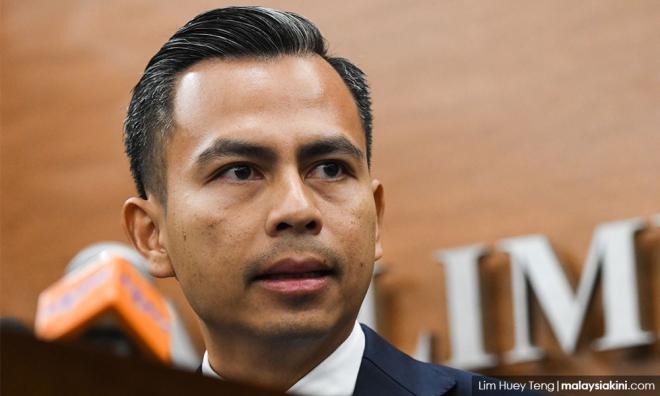
Lembah Pantai MP Fahmi Fadzil (above) has blasted a ministerial directive by Communications and Multimedia Minister Saifuddin Abdullah instructing the Malaysian Communications and Multimedia Commission (MCMC) over the allocation to five firms with spectrum bands for mobile internet services without an open tender.
In a statement today, he called the directive to allocate the telecommunications spectrum of 700 Megahertz (Mhz) "shocking" and said it violated the principles of transparent governance while raising questions over just how the firms were chosen.
"This violates the principle of transparency that was established by the past Pakatan Harapan administration," he said.
Following Fahmi's statement, Saifuddin announced that he will be aborting the directive in question pending a review.
Fahmi and Saifuddin were party colleagues before the latter defected and helped form the current PN government helmed by Prime Minister Muhyiddin Yassin.
“On July 1, 2019, the MCMC commenced a public inquiry process, where several guidelines were proposed, including the awarding of the bandwidth spectrum via tender, and some technical details.
This included the suggestion that an assignment of less than 2x10 MHz spectrum may not be ideal to deliver a high data rate and this may affect the ability of operators to achieve the National Fiberisation and Connectivity Plan (NFCP) targets and ensure improvements in quality of service.”
“In addition, in a reply by Altel Communication Sdn Bhd (one of the five companies awarded) to the MCMC dated Aug 30, 2019, Altel itself stated that it is best to have one operator provided with the entire 700 MHz spectrum, to facilitate telecommunication infrastructure to be more coordinated, avoiding waste and to be fairer to all mobile telecommunications service operators,” he said.

Fahmi said the MCMC report dated Sept 29, 2019, also indicated that the majority of companies that responded had called for a tendering process to be done, with almost no one stating that the 2x5 MHz spectrum block was suitable.
“Unfortunately, Saifuddin's directive means that no tender process was carried out or announced, no operator or consortium was given the entire spectrum, and the total 2x5 MHz spectrum block awarded to Altel and Telekom Malaysia did not follow MCMC’s initial recommendations on July 1, 2019, nor its later report,” claimed Fahmi.
“Unfortunately, Saifuddin's directive means that no tender process was carried out or announced, no operator or consortium was given the entire spectrum, and the total 2x5 MHz spectrum block awarded to Altel and Telekom Malaysia did not follow MCMC’s initial recommendations on July 1, 2019, nor its later report,” claimed Fahmi.
Calling on Saifuddin to explain himself, Fahmi added that the public was not informed about the fee imposed on the recipients.
Fahmi further demanded to know how much the companies will charge, and their plans for their allocated spectrum blocks over the next five years, especially in terms of infrastructure and services.
“I felt compelled to raise these questions because the 700 MHz spectrum is closely linked to the implementation of the 5G technology and the NFCP programme, which is the future of telecommunications technology and will surely impact the people.
“If mistakes of the past are repeated, including infrastructures that fail to be built or coordinated, it is the users who would end up losing,” he added.
Other companies listed as recipients are Celcom Axiata Berhad, Digi Telecommunications Sdn Bhd, Maxis Broadband Sdn Bhd, and Telekom Malaysian Berhad.
The directive was issued under Section 7 of the Communications and Multimedia Act 1998 (Act 588), according to the letter. - Mkini
Fahmi further demanded to know how much the companies will charge, and their plans for their allocated spectrum blocks over the next five years, especially in terms of infrastructure and services.
“I felt compelled to raise these questions because the 700 MHz spectrum is closely linked to the implementation of the 5G technology and the NFCP programme, which is the future of telecommunications technology and will surely impact the people.
“If mistakes of the past are repeated, including infrastructures that fail to be built or coordinated, it is the users who would end up losing,” he added.
Other companies listed as recipients are Celcom Axiata Berhad, Digi Telecommunications Sdn Bhd, Maxis Broadband Sdn Bhd, and Telekom Malaysian Berhad.
The directive was issued under Section 7 of the Communications and Multimedia Act 1998 (Act 588), according to the letter. - Mkini


No comments:
Post a Comment
Note: Only a member of this blog may post a comment.